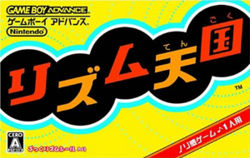Rhythm Tengoku

| |
| Rhythm Tengoku | |
| Developer | J.P. Room |
| Publisher | Nintendo |
| System | Game Boy Advance, Arcade |
| Release Date | Game Boy Advance JP August 3, 2006 Arcade JP September 20, 2007 |
| Rating | CERO: All Ages |
Rhythm Tengoku is a "groove-sense" rhythm game for the Game Boy Advance. It was developed by the same internal team responsible for the WarioWare series with the help of prolific Japanese songwriter and manager Tsunku♂.
Gameplay[edit]
The player is presented with a series of minigames that require the player to keep in time with the music. Unlike most rhythm games the musical score is not presented on screen and the players must use their own skill to time the beat. For example, in the first minigame the player must punch pots, rocks and light bulbs in time with the beat.
After a set of five minigames have been completed a Remix level appears. This level combines the prior five games into one song. As the game progresses, harder versions of certain minigames become playable and the remix levels will use various games outside of the last set.
After a game is over, the player is judged with a few comments on their performance ultimately ending in one of 3 outcomes (Try Again, OK, Great). A picture based on the outcome with a final comment is shown afterwards. By getting at least an OK the game is considered passed and the player moves on to the next one. By getting a Great, a medal will appear on the game's icon in the menu screen.
Any game with a Great status achieved will be randomly chosen for a Perfect Challenge. The player is given 3 chances to play the game without making a mistake. Succeeding will unlock a new song for the jukebox or supplemental reading material.
Earning medals will also unlock more extras such as Endless Games, Rhythm Toys, and Drum Lessons. Other extras include a coffee barista that gives you tips and a marathon of using the drum lessons for a full concert.
Trivia[edit]
- In 2006, Rhythm Tengoku won the Excellence Prize for Entertainment at the Japanese Media Arts Festival..
- To get themselves more in tune to the game, the development team took dance lessons with Tsunku♂ as the instructor.
- The game was very popular among the staff at Segaand approached Nintendo to make an Arcade game, which took the development team by surprise. Iwata immediately gave the green light to make the game.
- The onions in the hair plucking minigame were originally human faces but they were deemed "too gross".
Legacy & Sequals[edit]
- An Arcade port, handled by Sega, was released in 2007.
- A sequel to this game, Rhythm Tengoku Gold, was made for DS which came to America under the name Rhythm Heaven.